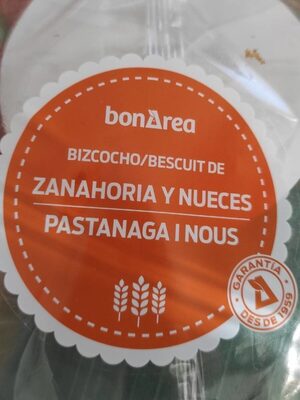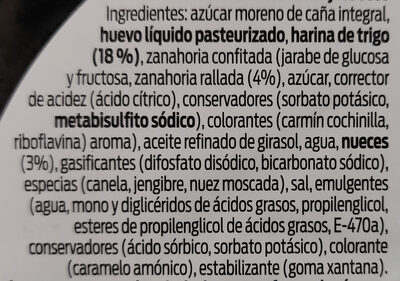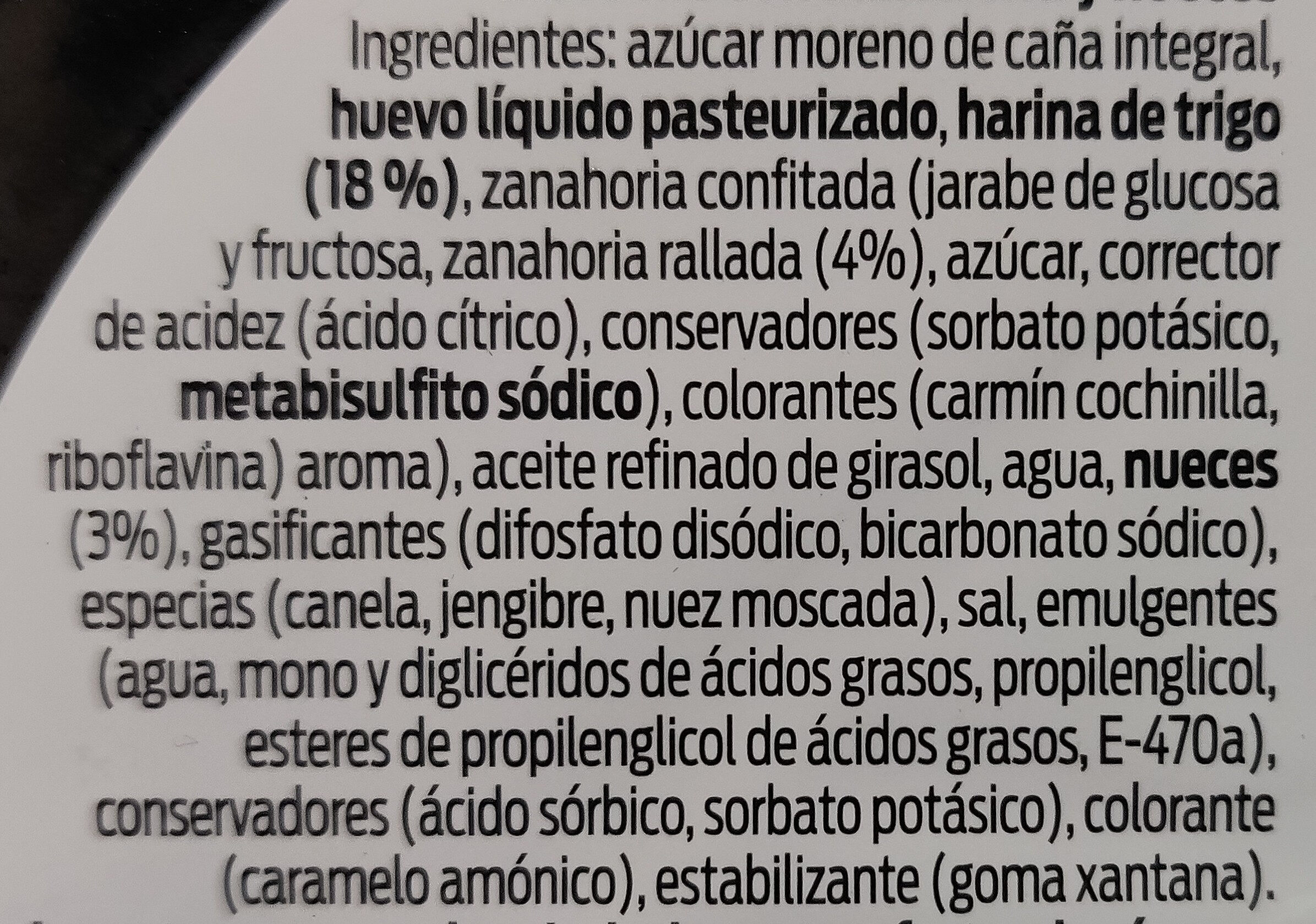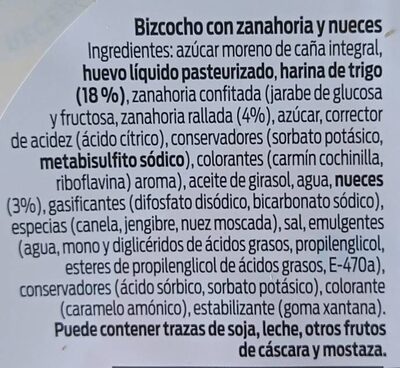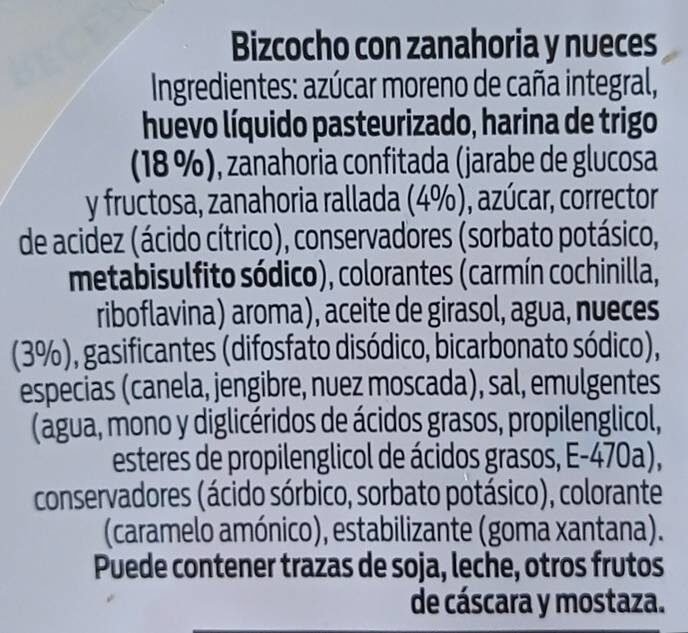Help us make food transparency the norm!
As a non-profit organization, we depend on your donations to continue informing consumers around the world about what they eat.
The food revolution starts with you!
Bizcocho de zanahoria y nueces - Bonarea - 420 g
Bizcocho de zanahoria y nueces - Bonarea - 420 g
This product page is not complete. You can help to complete it by editing it and adding more data from the photos we have, or by taking more photos using the app for Android or iPhone/iPad. Thank you!
×
Barcode: 8413585029359 (EAN / EAN-13)
Quantity: 420 g
Packaging: Plastic
Brands: Bonarea
Categories: Snacks, Sweet snacks, Biscuits and cakes, Cakes, Pound Cake
Traceability code: 20.16846/GE
Stores: BonÀrea
Countries where sold: Spain
Matching with your preferences
Health
Ingredients
-
40 ingredients
brown whole cane sugar, pasteurized liquid egg, wheat flour (18%), candied carrot (glucose and fructose syrup, grated carrot (4%), sugar, acidity corrector (citric acid), preservatives (potassium sorbate, sodium metabisulfite), dyes (carmine cochineal, riboflavin) aroma), refined sunflower oil, water, nuts (3%), gasifiers (disodium diphosphate, sodium bicarbonate), spices (cinnamon, ginger, nutmeg), salt, emulsifiers (water, mono and diglycerides of fatty acids, propylene glycol, propylene glycol esters of fatty acids, e-470a), preservatives (sorbic acid, potassium sorbate), coloring (ammonium caramel), stabilizer (xanthan gum)Allergens: Eggs, Gluten, NutsTraces: Milk, Nuts, Soybeans
Food processing
-
Ultra processed foods
Elements that indicate the product is in the 4 - Ultra processed food and drink products group:
- Additive: E101 - Riboflavin
- Additive: E120 - Cochineal
- Additive: E150c - Ammonia caramel
- Additive: E415 - Xanthan gum
- Additive: E450 - Diphosphates
- Additive: E470a - Sodium/potassium and calcium salts of fatty acids
- Additive: E471 - Mono- and diglycerides of fatty acids
- Ingredient: Colour
- Ingredient: Emulsifier
- Ingredient: Flavouring
- Ingredient: Glucose
Food products are classified into 4 groups according to their degree of processing:
- Unprocessed or minimally processed foods
- Processed culinary ingredients
- Processed foods
- Ultra processed foods
The determination of the group is based on the category of the product and on the ingredients it contains.
Additives
-
E101 - Riboflavin
Riboflavin: Riboflavin, also known as vitamin B2, is a vitamin found in food and used as a dietary supplement. Food sources include eggs, green vegetables, milk and other dairy product, meat, mushrooms, and almonds. Some countries require its addition to grains. As a supplement it is used to prevent and treat riboflavin deficiency and prevent migraines. It may be given by mouth or injection.It is nearly always well tolerated. Normal doses are safe during pregnancy. Riboflavin is in the vitamin B group. It is required by the body for cellular respiration.Riboflavin was discovered in 1920, isolated in 1933, and first made in 1935. It is on the World Health Organization's List of Essential Medicines, the most effective and safe medicines needed in a health system. Riboflavin is available as a generic medication and over the counter. In the United States a month of supplements costs less than 25 USD.Source: Wikipedia
-
E101i - Riboflavin
Riboflavin: Riboflavin, also known as vitamin B2, is a vitamin found in food and used as a dietary supplement. Food sources include eggs, green vegetables, milk and other dairy product, meat, mushrooms, and almonds. Some countries require its addition to grains. As a supplement it is used to prevent and treat riboflavin deficiency and prevent migraines. It may be given by mouth or injection.It is nearly always well tolerated. Normal doses are safe during pregnancy. Riboflavin is in the vitamin B group. It is required by the body for cellular respiration.Riboflavin was discovered in 1920, isolated in 1933, and first made in 1935. It is on the World Health Organization's List of Essential Medicines, the most effective and safe medicines needed in a health system. Riboflavin is available as a generic medication and over the counter. In the United States a month of supplements costs less than 25 USD.Source: Wikipedia
-
E120 - Cochineal
Carminic acid: Carminic acid -C22H20O13- is a red glucosidal hydroxyanthrapurin that occurs naturally in some scale insects, such as the cochineal, Armenian cochineal, and Polish cochineal. The insects produce the acid as a deterrent to predators. An aluminum salt of carminic acid is the coloring agent in carmine. Synonyms are C.I. 75470 and C.I. Natural Red 4. The chemical structure of carminic acid consists of a core anthraquinone structure linked to a glucose sugar unit. Carminic acid was first synthesized in the laboratory by organic chemists in 1991.Source: Wikipedia
-
E200 - Sorbic acid
Sorbic acid: Sorbic acid, or 2‚4-hexadienoic acid, is a natural organic compound used as a food preservative. It has the chemical formula CH3-CH-4CO2H. It is a colourless solid that is slightly soluble in water and sublimes readily. It was first isolated from the unripe berries of the Sorbus aucuparia -rowan tree-, hence its name.Source: Wikipedia
-
E202 - Potassium sorbate
Potassium sorbate (E202) is a synthetic food preservative commonly used to extend the shelf life of various food products.
It works by inhibiting the growth of molds, yeast, and some bacteria, preventing spoilage. When added to foods, it helps maintain their freshness and quality.
Some studies have shown that when combined with nitrites, potassium sorbate have genotoxic activity in vitro. However, potassium sorbate is generally recognized as safe (GRAS) by regulatory authorities.
-
E223 - Sodium metabisulphite
Sodium metabisulfite: Sodium metabisulfite or sodium pyrosulfite -IUPAC spelling; Br. E. sodium metabisulphite or sodium pyrosulphite- is an inorganic compound of chemical formula Na2S2O5. The substance is sometimes referred to as disodium metabisulfite. It is used as a disinfectant, antioxidant, and preservative agent.Source: Wikipedia
-
E330 - Citric acid
Citric acid is a natural organic acid found in citrus fruits such as lemons, oranges, and limes.
It is widely used in the food industry as a flavor enhancer, acidulant, and preservative due to its tart and refreshing taste.
Citric acid is safe for consumption when used in moderation and is considered a generally recognized as safe (GRAS) food additive by regulatory agencies worldwide.
-
E415 - Xanthan gum
Xanthan gum (E415) is a natural polysaccharide derived from fermented sugars, often used in the food industry as a thickening and stabilizing agent.
This versatile food additive enhances texture and prevents ingredient separation in a wide range of products, including salad dressings, sauces, and gluten-free baked goods.
It is considered safe for consumption even at high intake amounts.
-
E450 - Diphosphates
Diphosphates (E450) are food additives often utilized to modify the texture of products, acting as leavening agents in baking and preventing the coagulation of canned food.
These salts can stabilize whipped cream and are also found in powdered products to maintain their flow properties. They are commonly present in baked goods, processed meats, and soft drinks.
Derived from phosphoric acid, they're part of our daily phosphate intake, which often surpasses recommended levels due to the prevalence of phosphates in processed foods and drinks.
Excessive phosphate consumption is linked to health issues, such as impaired kidney function and weakened bone health. Though diphosphates are generally regarded as safe when consumed within established acceptable daily intakes, it's imperative to monitor overall phosphate consumption to maintain optimal health.
-
E471 - Mono- and diglycerides of fatty acids
Mono- and diglycerides of fatty acids (E471), are food additives commonly used as emulsifiers in various processed foods.
These compounds consist of glycerol molecules linked to one or two fatty acid chains, which help stabilize and blend water and oil-based ingredients. E471 enhances the texture and shelf life of products like margarine, baked goods, and ice cream, ensuring a smooth and consistent texture.
It is generally considered safe for consumption within established regulatory limits.
-
E490 - Propylene glycol
Propylene glycol: Propylene glycol -IUPAC name: propane-1‚2-diol- is a synthetic organic compound with the chemical formula C3H8O2. It is a viscous, colorless liquid which is nearly odorless but possesses a faintly sweet taste. Chemically it is classed as a diol and is miscible with a broad range of solvents, including water, acetone, and chloroform. It is produced on a large scale and is primarily used in the production of polymers, but also sees use in food processing, and as a process fluid in low-temperature heat-exchange applications. In the European Union, it has the E-number E1520 for food applications. For cosmetics and pharmacology, the number is E490. Propylene glycol is also present in propylene glycol alginate which known as E405. The compound is sometimes called -alpha- α-propylene glycol to distinguish it from the isomer propane-1‚3-diol, known as -beta- β-propylene glycol.Source: Wikipedia
-
E500 - Sodium carbonates
Sodium carbonates (E500) are compounds commonly used in food preparation as leavening agents, helping baked goods rise by releasing carbon dioxide when they interact with acids.
Often found in baking soda, they regulate the pH of food, preventing it from becoming too acidic or too alkaline. In the culinary world, sodium carbonates can also enhance the texture and structure of foods, such as noodles, by modifying the gluten network.
Generally recognized as safe, sodium carbonates are non-toxic when consumed in typical amounts found in food.
-
E500ii - Sodium hydrogen carbonate
Sodium hydrogen carbonate, also known as E500ii, is a food additive commonly used as a leavening agent.
When added to recipes, it releases carbon dioxide gas upon exposure to heat or acids, causing dough to rise and resulting in a light, fluffy texture in baked goods.
It is generally recognized as safe (GRAS) by regulatory authorities when used in appropriate quantities and poses no significant health risks when consumed in typical food applications.
Ingredients analysis
-
May contain palm oil
Ingredients that may contain palm oil: E471, E470a
-
Non-vegan
Non-vegan ingredients: Liquid egg, E120
-
Non-vegetarian
Non-vegetarian ingredients: E120
-
Details of the analysis of the ingredients
: Azúcar moreno de caña integral, huevo líquido, harina de trigo 18%, zanahoria (jarabe de glucosa y fructosa, zanahoria 4%, azúcar, corrector de acidez (ácido cítrico), conservadores (sorbato potásico, metabisulfito sódico), colorantes (carmín cochinilla, riboflavina), aroma), aceite refinado de girasol, agua, nueces 3%, gasificantes (difosfato disódico, bicarbonato sódico), especias (canela, jengibre, nuez moscada), sal, emulgentes (agua, mono- y diglicéridos de ácidos grasos, propilenglicol, esteres de propilenglicol de ácidos grasos, e470a), conservadores (ácido sórbico, sorbato potásico), colorante (caramelo amónico), estabilizante (goma xantana)- Azúcar moreno de caña integral -> en:whole-brown-cane-sugar - vegan: yes - vegetarian: yes - ciqual_proxy_food_code: 31016 - percent_min: 18 - percent_max: 47
- huevo líquido -> en:liquid-egg - vegan: no - vegetarian: yes - ciqual_food_code: 22000 - percent_min: 18 - percent_max: 32.5
- harina de trigo -> en:wheat-flour - vegan: yes - vegetarian: yes - ciqual_proxy_food_code: 9410 - percent_min: 18 - percent: 18 - percent_max: 18
- zanahoria -> en:carrot - vegan: yes - vegetarian: yes - ciqual_food_code: 20009 - percent_min: 8 - percent_max: 18
- jarabe de glucosa y fructosa -> en:glucose-fructose-syrup - vegan: yes - vegetarian: yes - ciqual_food_code: 31077 - percent_min: 4 - percent_max: 14
- zanahoria -> en:carrot - vegan: yes - vegetarian: yes - ciqual_food_code: 20009 - percent_min: 4 - percent: 4 - percent_max: 4
- azúcar -> en:sugar - vegan: yes - vegetarian: yes - ciqual_proxy_food_code: 31016 - percent_min: 0 - percent_max: 4
- corrector de acidez -> en:acidity-regulator - percent_min: 0 - percent_max: 4
- ácido cítrico -> en:e330 - vegan: yes - vegetarian: yes - percent_min: 0 - percent_max: 4
- conservadores -> en:preservative - percent_min: 0 - percent_max: 3.33333333333333
- sorbato potásico -> en:e202 - vegan: yes - vegetarian: yes - percent_min: 0 - percent_max: 3.33333333333333
- metabisulfito sódico -> en:e223 - vegan: yes - vegetarian: yes - percent_min: 0 - percent_max: 1.66666666666667
- colorantes -> en:colour - percent_min: 0 - percent_max: 2.5
- carmín cochinilla -> en:e120 - vegan: no - vegetarian: no - percent_min: 0 - percent_max: 2.5
- riboflavina -> en:e101 - vegan: maybe - vegetarian: yes - percent_min: 0 - percent_max: 1.25
- aroma -> en:flavouring - vegan: maybe - vegetarian: maybe - percent_min: 0 - percent_max: 2
- aceite refinado de girasol -> en:refined-sunflower-oil - vegan: yes - vegetarian: yes - from_palm_oil: no - ciqual_food_code: 17440 - percent_min: 3 - percent_max: 18
- agua -> en:water - vegan: yes - vegetarian: yes - ciqual_food_code: 18066 - percent_min: 3 - percent_max: 13.25
- nueces -> en:walnut - vegan: yes - vegetarian: yes - ciqual_food_code: 15023 - percent_min: 3 - percent: 3 - percent_max: 3
- gasificantes -> en:raising-agent - percent_min: 0 - percent_max: 3
- difosfato disódico -> en:e450i - vegan: yes - vegetarian: yes - percent_min: 0 - percent_max: 3
- bicarbonato sódico -> en:e500ii - vegan: yes - vegetarian: yes - percent_min: 0 - percent_max: 1.5
- especias -> en:spice - vegan: yes - vegetarian: yes - percent_min: 0 - percent_max: 3
- canela -> en:cinnamon - vegan: yes - vegetarian: yes - percent_min: 0 - percent_max: 3
- jengibre -> en:ginger - vegan: yes - vegetarian: yes - ciqual_food_code: 11074 - percent_min: 0 - percent_max: 1.5
- nuez moscada -> en:nutmeg-nut - vegan: yes - vegetarian: yes - ciqual_food_code: 11048 - percent_min: 0 - percent_max: 1
- sal -> en:salt - vegan: yes - vegetarian: yes - ciqual_food_code: 11058 - percent_min: 0 - percent_max: 1.1
- emulgentes -> en:emulsifier - percent_min: 0 - percent_max: 1.1
- agua -> en:water - vegan: yes - vegetarian: yes - ciqual_food_code: 18066 - percent_min: 0 - percent_max: 1.1
- mono- y diglicéridos de ácidos grasos -> en:e471 - vegan: maybe - vegetarian: maybe - from_palm_oil: maybe - percent_min: 0 - percent_max: 0.55
- propilenglicol -> en:e490 - vegan: yes - vegetarian: yes - percent_min: 0 - percent_max: 0.366666666666667
- esteres de propilenglicol de ácidos grasos -> en:e477 - vegan: maybe - vegetarian: maybe - percent_min: 0 - percent_max: 0.275
- e470a -> en:e470a - vegan: maybe - vegetarian: maybe - from_palm_oil: maybe - percent_min: 0 - percent_max: 0.22
- conservadores -> en:preservative - percent_min: 0 - percent_max: 1.1
- ácido sórbico -> en:e200 - vegan: yes - vegetarian: yes - percent_min: 0 - percent_max: 1.1
- sorbato potásico -> en:e202 - vegan: yes - vegetarian: yes - percent_min: 0 - percent_max: 0.55
- colorante -> en:colour - percent_min: 0 - percent_max: 1.1
- caramelo amónico -> en:e150a - vegan: yes - vegetarian: yes - percent_min: 0 - percent_max: 1.1
- estabilizante -> en:stabiliser - percent_min: 0 - percent_max: 1.1
- goma xantana -> en:e415 - vegan: yes - vegetarian: yes - percent_min: 0 - percent_max: 1.1
Nutrition
-
Poor nutritional quality
⚠ ️Warning: the amount of fruits, vegetables and nuts is not specified on the label, it was estimated from the list of ingredients: 7This product is not considered a beverage for the calculation of the Nutri-Score.
Positive points: 1
- Proteins: 3 / 5 (value: 4.9, rounded value: 4.9)
- Fiber: 1 / 5 (value: 1.8, rounded value: 1.8)
- Fruits, vegetables, nuts, and colza/walnut/olive oils: 0 / 5 (value: 7, rounded value: 7)
Negative points: 16
- Energy: 4 / 10 (value: 1565, rounded value: 1565)
- Sugars: 6 / 10 (value: 27.7, rounded value: 27.7)
- Saturated fat: 2 / 10 (value: 2.6, rounded value: 2.6)
- Sodium: 4 / 10 (value: 440, rounded value: 440)
The points for proteins are not counted because the negative points are greater or equal to 11.
Nutritional score: (16 - 1)
Nutri-Score:
-
Nutrient levels
-
Fat in moderate quantity (18.1%)
What you need to know- A high consumption of fat, especially saturated fats, can raise cholesterol, which increases the risk of heart diseases.
Recommendation: Limit the consumption of fat and saturated fat- Choose products with lower fat and saturated fat content.
-
Saturated fat in moderate quantity (2.6%)
What you need to know- A high consumption of fat, especially saturated fats, can raise cholesterol, which increases the risk of heart diseases.
Recommendation: Limit the consumption of fat and saturated fat- Choose products with lower fat and saturated fat content.
-
Sugars in high quantity (27.7%)
What you need to know- A high consumption of sugar can cause weight gain and tooth decay. It also augments the risk of type 2 diabetes and cardio-vascular diseases.
Recommendation: Limit the consumption of sugar and sugary drinks- Sugary drinks (such as sodas, fruit beverages, and fruit juices and nectars) should be limited as much as possible (no more than 1 glass a day).
- Choose products with lower sugar content and reduce the consumption of products with added sugars.
-
Salt in moderate quantity (1.1%)
What you need to know- A high consumption of salt (or sodium) can cause raised blood pressure, which can increase the risk of heart disease and stroke.
- Many people who have high blood pressure do not know it, as there are often no symptoms.
- Most people consume too much salt (on average 9 to 12 grams per day), around twice the recommended maximum level of intake.
Recommendation: Limit the consumption of salt and salted food- Reduce the quantity of salt used when cooking, and don't salt again at the table.
- Limit the consumption of salty snacks and choose products with lower salt content.
-
-
Nutrition facts
Nutrition facts As sold
for 100 g / 100 mlCompared to: Pound Cake Energy 1,565 kj
(374 kcal)-11% Fat 18.1 g -17% Saturated fat 2.6 g -71% Carbohydrates 47 g -4% Sugars 27.7 g - Fiber 1.8 g +44% Proteins 4.9 g -13% Salt 1.1 g +28% Fruits‚ vegetables‚ nuts and rapeseed‚ walnut and olive oils (estimate from ingredients list analysis) 7 %
Environment
-
Eco-Score C - Moderate environmental impact
⚠ ️Select a country in order to include the full impact of transportation.The Eco-Score is an experimental score that summarizes the environmental impacts of food products.→ The Eco-Score was initially developped for France and it is being extended to other European countries. The Eco-Score formula is subject to change as it is regularly improved to make it more precise and better suited to each country.Life cycle analysis
-
Average impact of products of the same category: C (Score: 59/100)
Category: Pound cake, prepacked
Category: Pound cake, prepacked
- PEF environmental score: 0.44 (the lower the score, the lower the impact)
- including impact on climate change: 3.69 kg CO2 eq/kg of product
Stage Impact Agriculture
82.3 %Processing
9.7 %Packaging
4.3 %Transportation
2.6 %Distribution
1.1 %Consumption
0.0 %
Bonuses and maluses
-
Missing origins of ingredients information
Malus: -5
⚠ ️ The origins of the ingredients of this product are not indicated.
If they are indicated on the packaging, you can modify the product sheet and add them.
If you are the manufacturer of this product, you can send us the information with our free platform for producers.
-
Packaging with a medium impact
Malus: -10
Shape Material Recycling Impact Unknown Plastic High ⚠ ️ The information about the packaging of this product is not sufficiently precise (exact shapes and materials of all components of the packaging).⚠ ️ For a more precise calculation of the Eco-Score, you can modify the product page and add them.
If you are the manufacturer of this product, you can send us the information with our free platform for producers.
Eco-Score for this product
-
Impact for this product: C (Score: 44/100)
Product: Bizcocho de zanahoria y nueces - Bonarea - 420 g
Life cycle analysis score: 59
Sum of bonuses and maluses: -15
Final score: 44/100
-
Carbon footprint
-
Equal to driving 1.9 km in a petrol car
369 g CO² per 100g of product
The carbon emission figure comes from ADEME's Agribalyse database, for the category: Pound cake, prepacked (Source: ADEME Agribalyse Database)
Stage Impact Agriculture
81.6 %Processing
6.4 %Packaging
7.8 %Transportation
3.7 %Distribution
0.5 %Consumption
0.0 %
Packaging
-
Packaging with a medium impact
-
Packaging parts
(Plastic)
-
Packaging materials
Material % Packaging weight Packaging weight per 100 g of product Plastic
-
Transportation
-
Origins of ingredients
Missing origins of ingredients information
⚠ ️ The origins of the ingredients of this product are not indicated.
If they are indicated on the packaging, you can modify the product sheet and add them.
If you are the manufacturer of this product, you can send us the information with our free platform for producers.Add the origins of ingredients for this product Add the origins of ingredients for this product
Report a problem
-
Incomplete or incorrect information?
Category, labels, ingredients, allergens, nutritional information, photos etc.
If the information does not match the information on the packaging, please complete or correct it. Open Food Facts is a collaborative database, and every contribution is useful for all.
Data sources
Product added on by kiliweb
Last edit of product page on by roboto-app.
Product page also edited by elcoco, inf, jaucafo, openfoodfacts-contributors, packbot, yuka.sY2b0xO6T85zoF3NwEKvlk5cQdXiiA7_CAbQuF2g5PuIcLG1O9J85JGkbqo, yuka.sY2b0xO6T85zoF3NwEKvlmlICYaAuyjfGiDvnXa3xIekK5r5UYkiwpXjEas, yuka.sY2b0xO6T85zoF3NwEKvlndHa4PykC2aFxX5nhOJ3_mpDLbZZ9xQx5TmDas.
